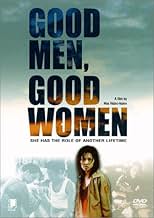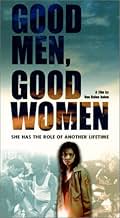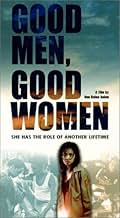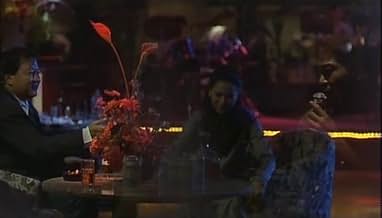Intended as the concluding film in the trilogy on the modern history of Taiwan began with Beiqing Chengshi (1989), this film reveals the story through three levels: a film within a film as w... Read allIntended as the concluding film in the trilogy on the modern history of Taiwan began with Beiqing Chengshi (1989), this film reveals the story through three levels: a film within a film as well as the past and present as linked by a young woman, Liang Ching. She is being persecut... Read allIntended as the concluding film in the trilogy on the modern history of Taiwan began with Beiqing Chengshi (1989), this film reveals the story through three levels: a film within a film as well as the past and present as linked by a young woman, Liang Ching. She is being persecuted by an anonymous man who calls her repeatedly but does not speak. He has stolen her diar... Read all
- Director
- Writers
- Stars
- Awards
- 11 wins & 5 nominations total
- Director
- Writers
- All cast & crew
- Production, box office & more at IMDbPro
Featured reviews
Take Good Men, Good Women. It's not a bad movie, really. Certainly not Hou's worst. Its main claim to greatness is its excellent cinematography, with some sections in a high-contrast black and white and others in brilliant color. Hou also decides to move his camera a bit and film from different angles. He's finally caught up with D.W. Griffith, although he still falls back on his favorite compositions again and again. The narrative is often great - there are several great individual scenes - but it's ultimately too difficult to follow, which is the exact same complaint I had of my (currently) favorite Hou film, City of Sadness. The plot of Good Men, Good Women revolves around the life of a famous Taiwanese actress (a real person; the film is dedicated to her) and, in the more modern section of the film, an actress who is apparently going to play this former actress in a film about her life (her story is broken into two different time periods). This made sense after I read up on it, but it was really confusing when I was watching it. I assume the same actress played both parts. It's confusing because Hou doesn't want to stress anything: characters are introduced with their backs to us or when they're in shadows. How does he really expect us to recognize and latch onto his characters? He just doesn't care. No, that's not it. It's that he doesn't want us to do so: some pretentious notion that a confusing movie is an artistic one.
If I were to see this film again, I might find it better. It's still cinematic masturbation. If the audience, after reading up on it or seeing it several times, then understands it, well, it only becomes mutual masturbation. Satisfying, but wouldn't you much rather be f*cking?
This is a movie that bravely confronts issues in a country that is too preoccupied with trying to juggle for positions in the global market. A reminder to everyone that a country's history does not consist of only the valiant highlights, but also of shameful past that should not be discarded.
So Zhang can do intense drama, and Wong can direct spontaneous acting. Hou Hsiou Hsien (or his colleagues Tsai Ming Liang and Edward Yang), however, is of a different breed. His films (that I've seen anyway) are casual but deliberately never ever strive to be interesting. For example, there's no moody music, showy cinematography, or thought-provoking dialogue to spice things up while you watch a 2-minute long take of people walking. Everything is just as indifferent as it is and nothing more; then it's up to us to give it a meaning -- that is the essence of MINIMALISM which define Hou's body of work. Minimalist cinema is by far the most difficult to grasp and sit through (since "nothing happens," some will understandably accuse), and many viewers detest it with a passion. Whether this style is actually effective I do not know, "all I know is this: once I was blind and now I can see." Good Men Good Women is an eye opener for me.
In recent years, several well-noted Chinese art house filmmakers have upgraded to generously budgeted blockbusters: Ang Lee with Crouching Tiger, Zhang Yimou with Hero and Flying Dagger, He Ping with Warriors of Heaven & Earth, Fruit Chan with Three Extremes: Dumpling, not to forget Cheng Kaige's special effects fantasy extravaganza The Promise on the way, followed by Wong Kar Wai reportedly to film an American feature The Lady from Shanghai with Nicole Kidman, and words of Hou's Taiwanese colleague Edward Yang to direct an animation produced by Jackie Chan. In such a relaxing trend, will Hou Hsiou Hsien have any surprises for us, or will he continue to explore Taiwan in minimalist glory?
Hou's style is subtle, an excellent cinematographer and picture taker, like many of the Asian films (whether this is from a common thread or by accident I don't know). He is not as overtly stylish as Wong Kar-Wai, but the shots he takes and chooses (perhaps the better adjective) are beautiful.
A previous commentator called this style "cinematic masturbation", which I think is an adolescent argument. Just because the points don't hit you over the head doesn't mean they are not being made. This is a political film, dealing with a still sensitive topic. The director definitely cares about the audience. Like anything else, it's the little details that count.
One of those little details is an Ozu film being played on TV in one background shot. Hou has consciously acknowledged Ozu as an influence and his style shows it. The action, so to speak, takes place within the context of the everyday events. The points being made are observed by the routine actions, and unique touches within them.
The most solid point being the commonality of loss, and tragedy between two Taiwanese actresses of different generations. Both lose lovers, and sacrifice children to the events around them.
The other point is the simultaneous affluence and emptiness is modern day life. The actress in the older story is based on a real person, who joined the anti-Japanese resistance in China during WWII. After this, her husband is executed in an anti-communist crackdown in Taiwan. She is both pushed along by events, but shows a determination to live her life and make decisions, This is in contrast to the other story, that of the actress playing (there is a movie within a movie), who is looking back on a life with petty gangsters, drinking and drugs. In material goods she is richer than the older actress ever was, with her upper middle class life, yet poorer in far more many ways. Both are played by the same actress, who handles the two stories well.
In the Hou portfolio, I prefer this to Goodbye South Goodbye, which I felt got a little lost in fancy camera work, but I feel that this is close to Flowers of Shanghai.
Did you know
- ConnectionsFeatures Printemps tardif (1949)
Details
- Runtime
- 1h 48m(108 min)
- Color
- Sound mix
- Aspect ratio
- 1.78 : 1























